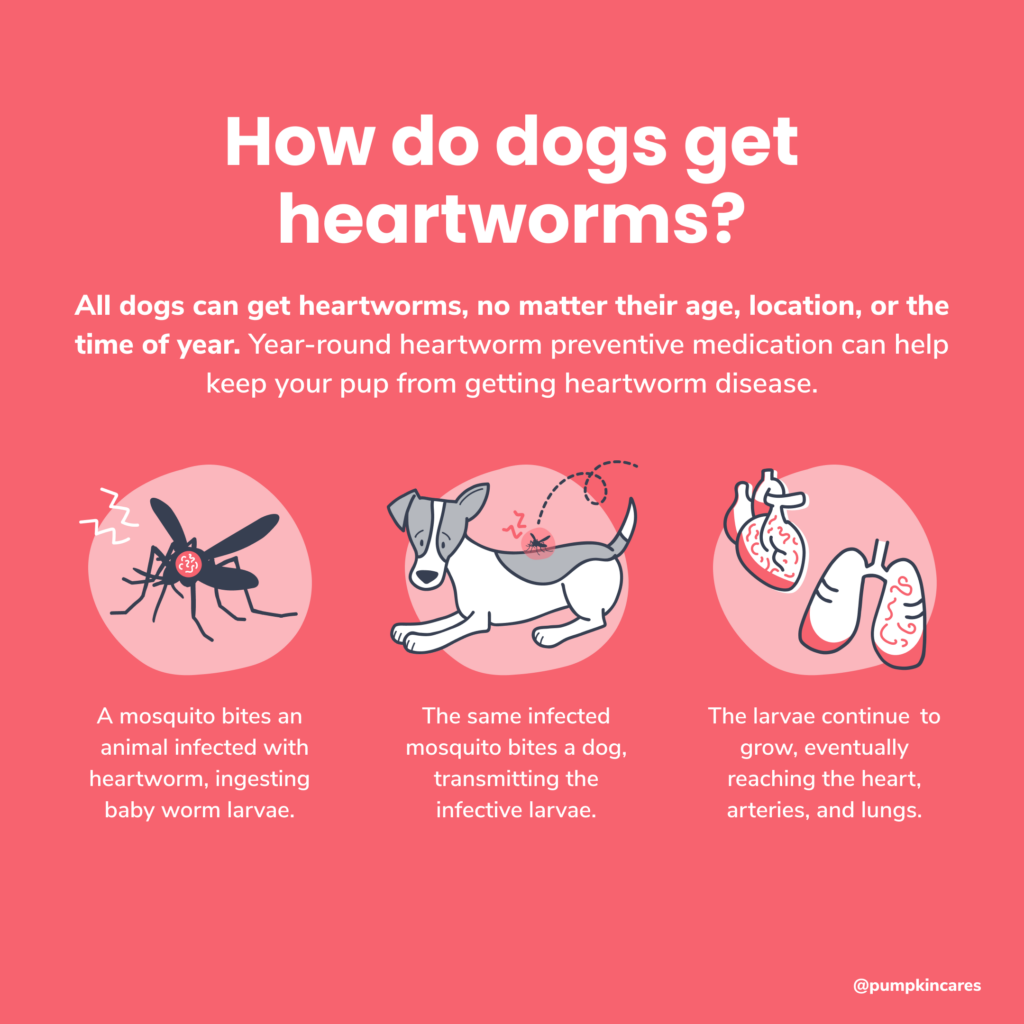Key Points
- Heartworms are internal parasites spread by mosquito bites that can make your dog seriously sick.
- Heartworm disease can cause difficulty breathing, fatigue, and weight loss, as well as severe damage to the lungs if it’s not caught early.
- Luckily, heartworm disease is easily avoidable with preventative medication and regular testing — and if you join the Pumpkin Wellness Club*, you have the option to get $150 in cash back on routine flea, tick, and heartworm prevention each year.
If you’ve never seen a fully grown heartworm, count yourself lucky. Heartworms are parasites spread by mosquitoes that can grow up to a foot long inside your dog — and as you may have guessed by the name, these worms can take up residence in and around a dog’s heart, causing life-threatening damage.
One in every 100 dogs tested for heartworms in the US are positive for the infection, and these parasites can spread surreptitiously. When a mosquito bites a dog (or a fox, coyote, or another wild animal) that is infected with heartworms, it can spread the parasite to the animal it bites next. Rather than trying to avoid mosquitoes entirely — a fool’s errand if there ever was one — it’s important that you protect your dog from the risks associated with their pesky bites.
As a pet parent, you can take a few simple steps to protect your dog from heartworm disease. It’ll require some planning ahead and consulting a licensed veterinarian, plus paying out of pocket for preventive medication and routine testing.
If you’re worried about the costs of wellness visits and prescriptions piling up — yearly flea, tick, and heartworm prevention is just the start! You may want to consider a wellness plan or program that gives you cash back and helps you save on routine preventive care your pup needs to stay healthy and disease-free. The Pumpkin Wellness Club can help you plan ahead and save up to $360/year on routine wellness visits, vaccinations, and more, plus perks such as access to discounts on top pet brands.
Starting at $19.95/month for dog owners, a Pumpkin Wellness Club membership not only gives you cash back on your pet’s preventive care, but also comes with special savings and discounts on a curated selection of pet products. And remember: a healthy and happy pet is priceless.
What is heartworm disease?

Similar to tapeworms, hookworms, roundworms, or ringworms, heartworms are parasites that can grow up to a foot long inside your pet. It’s not just dogs who are at risk: heartworms can also infect cats and ferrets, although it’s less common.
Unfortunately, heartworms spend most of their life cycle trying to infect a dog (their preferred host) and grow to maturity inside their body. This is known as heartworm disease, and it can be fatal if not treated.
Some dogs live with heartworms for a long time with little to no outside indicators of infection. That said, heartworms have a lifespan of five to seven years, so they have plenty of time to wreak havoc on your dog’s system.
The worms will eventually cause inflammation and blockage around your dog’s heart and lungs, and if left untreated, heartworm disease can lead to heart failure as well as liver or kidney failure, according to veterinarian and author Dr. Margit Muller, DVM.
The good news: You can lower your dog’s risk of heartworm disease with preventive medication and annual blood tests. But it’s still important to know the signs, especially if your pup spends a lot of time outside in mosquito territory.
Are heartworms more common in certain areas of the US?
If you live in a climate where mosquitoes are common, your dog is at higher risk of contracting heartworms. Mosquitoes are particularly common around bodies of water, such as lakes and rivers, as mosquito larvae require freshwater to mature.
The Companion Animal Parasite Council tracks the prevalence of heartworm infections in the US and Canada, as well as the spread of tick-borne and viral illnesses that can sicken your pet. This handy tracker can let you know if there’s an uptick of heartworm infections in your area — for instance, southern states including Texas, Louisiana, Arkansas, and Mississippi are considered high-risk for heartworm.
But as anyone who’s ended up covered in bug bites after a day in the sun can tell you, mosquitoes can strike anywhere. The relocation of infected pets to previously uninfected areas can also contribute to the spread of heartworm disease. That’s why it’s important, no matter where you live, to be aware of the risks of heartworm disease and be prepared to manage them.
What are the symptoms of heartworm disease?
Dogs are more vulnerable to heartworm than other animals that can contract the disease, so recognizing the signs and symptoms — and knowing the best practices for heartworm treatment and prevention — is especially critical for dog owners.
Your dog is unlikely to show symptoms of heartworm disease immediately after a buggy day in the woods. The infection can progress undetected for months, as it takes 6 months for the larvae passed via mosquito bite to mature into an adult heartworm.
If your dog is carrying heartworms, they may have no symptoms at all for months after exposure. Still, you should look out for the following signs that can show the infection has progressed:
- Difficulty breathing
- Mild persistent cough
- Resistance to exercise
- Fatigue after moderate activity
- Decreased appetite
- Weight loss
- Syncope (passing out)
If you notice your dog displaying any of these symptoms, consult with your local veterinarian immediately. It’s best to diagnose and treat the disease early, rather than waiting for your pet’s annual wellness visit.
As heartworm disease progresses, your dog risks more severe symptoms of organ failure, such as trouble breathing, dark urine, distended belly, and pale gums. These can be signs of caval syndrome: a severe form of heartworm disease that occurs when a mass of worms blocks blood flow to the heart.
It’s no exaggeration to call this a medical emergency, and you should treat it as such. Caval syndrome progresses rapidly and can be fatal if not treated with surgical intervention. Visit your veterinarian or an emergency vet immediately if you notice any potential symptoms of heartworm disease.
What preventive medications are safe for my dog?
The American Heartworm Society recommends year-round preventive treatment and annual heartworm testing for dogs. These medications are available as a once-a-month chewable, a once-a-month topical, and either a once or twice-a-year injection.
Many heartworm preventive medications also offer protection against intestinal worms and external parasites, such as fleas and ticks. A combination preventative such as Simparica Trio costs between $160–200 for a 6-month supply, depending on the size of your dog. Luckily, Pumpkin Wellness Club members can choose a plan with $150 in cash back on annual tick, flea, and heartworm prevention (plus other treats to keep your pet healthy and your wallet happy).
It’s perfectly safe to start your puppy’s heartworm prevention as early as the product label allows; in fact, the AHS recommends starting heartworm preventives before your dog is 8 weeks old.
Heartworm disease is not contagious in the sense that dogs can’t spread it directly to each other. But when dogs live in close proximity, it’s not hard to imagine the disease spreading through successive mosquito bites. That doesn’t mean you need to quarantine your pups from each other — it just means that detection and prevention are even more important.
How is heartworm disease diagnosed?
Even if your pup is on preventive medication, they need a heartworm test at least once a year. Unfortunately, no medication is 100% effective, so it’s important to screen for disease. If you have a new puppy, most vets start heartworm testing at 6–7 months of age.
Annual wellness exams are also essential, not just for heartworm but for all diseases that affect dogs. Vets recommend an annual blood test for heartworm and a yearly stool test for intestinal parasites (another opportunity for up to $100 cash back if you’re part of the Pumpkin Wellness Club). The goal is to detect infections early so that your dog suffers less, infectious disease is contained, and treatment is more effective.
How is heartworm disease treated?
Some of the most common heartworm treatments include ivermectin (commonly sold as Iverhart or as Tri-Heart Plus), selamectin, moxidectin, and milbemycin oxime. Some of these medications are multipurpose; for example, selamectin is also used to treat ear mites. It should go without saying, however, that humans should definitely not take these medications, whatever their symptoms.
All of these medications have to be prescribed by a vet, since they may have serious side effects for certain breeds. Ivermectin, for instance, poses risks to collies and some other related breeds.
Don’t wait until your dog starts to look or act ill to take action — prevention is protection. Treatment for heartworm is often arduous, expensive, and has more serious side effects than preventive medication.
What about natural heartworm preventives and treatments?
You may feel tempted to look into “natural” prevention options. But any natural prevention options, helpful as they might be, should be undertaken in conjunction with, not in place of, medication and veterinary treatment. Vets agree that regularly applied medication – in chewable, topical, or injectable forms – is the best preventive treatment.
You only want to do what’s best for your dog, and that’s understandable. But being able to weigh the risks and benefits is crucial – and the benefits of preventive medication far outweigh the risks. Trust the veterinary science and give your dog the treatment they need.
DISCLOSURE





